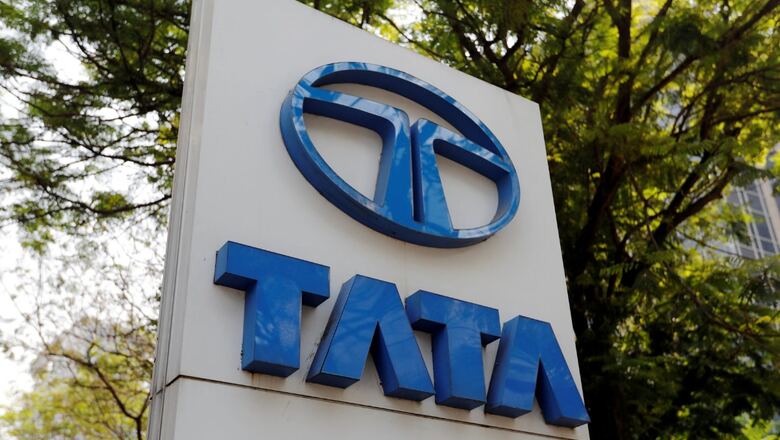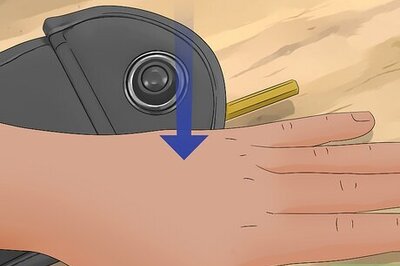
views
Tata Motors DVR shares surged almost 18 per cent to hit their fresh 52-week high of Rs 440 on BSE in opening deals on Wednesday(July 26) a day after Tata Motors announced it will convert its DVR shares to ordinary shares. On the NSE, the stock jumped 17 per cent.
Tata Motors is converting DVR shares to ordinary shares: What are DVRs?
Tata Motors Ltd has two types of listed equity securities, namely Ordinary Shares and ‘A’ Ordinary Shares (DVRs). DVRs carry 1/10th of the voting rights of ordinary shares and are entitled to a five percentage points higher dividend.
The DVR shares were first issued by TML in 2008, and subsequently in a further QIP in 2010 and a rights issue in 2015. Regulatory changes have since restricted the issuance of such instruments with differential voting rights, and TML remains the only large listed corporate with such an instrument.
“The Capital Reduction Consideration implies a 23 per cent premium on the previous day’s closing share price of ‘A’ Ordinary shares, translating to a 30 per cent discount over the ordinary share price and significantly below its historical averages. The Scheme will lead to a reduction in the outstanding equity shares by 4.2 per cent, making it value accretive for all shareholders, “ Tata Motors said in a statement
The Scheme also envisages the creation of a Trust with an independent third party acting as a trustee to operationalise the scheme.
“We are keen to simplify our capital structure. The challenge of DVR shares is that the instrument lost its charm in 2010, when the regulator had concerns about the use of the instrument. We tried infusing liquidity while the discount started averaging 48 per cent. The issue was raised by DVR holders in the meeting. Therefore, the solution to the problem was to cancel all ‘A’ ordinary shares and give them ordinary shares. This is fair for both ‘A’ ordinary shareholders and ordinary shareholders,” said PL Balaji, Group Chief Financial Officer, Tata Motors.
Who are the DVR Holders?
More than 92 per cent of Tata Motors DVRs are held by the public, the automaker counts some marquee investors in this list. Mutual funds have a 28.82 per cent stake in Tata Motors DVRs, with ICICI Prudential holding the highest at 19.35 per cent.
Among foreign portfolio investors, who cumulatively hold 18.6 per cent, are Franklin Templeton, Government of Singapore, and Vanguard. Tata Motors DVRs are also held by Rekha Rakesh Jhunjhunwala. She held a 1.92 per cent stake as of June end.
What Happens Now?
Under the scheme of arrangement, the DVR holders will get seven fully paid-up ordinary shares of the company, for every 10 DVRs they hold.
The capital reduction consideration implies a 23 per cent premium on the previous day’s closing price of DVRs, translating to a 30 per cent discount over the ordinary share price.
The scheme will lead to a reduction in the outstanding equity shares by 4.2 per cent, making it value accretive for all shareholders.
Tata Motors will create a Trust, which will receive the new ordinary shares from the company on behalf and for the benefit of each of the relevant shareholders.
What Should Be The Trading Strategy?
The DVRs currently trade at about a 43 per cent discount to the ordinary shares.
As traders saw arbitrage opportunity, Tata Motors DVR shares jumped 18% to day’s high at Rs 440 today.
If the spread trades at around 8-10 per cent +/-, then the existing DVR/ordinary share spread holders should unwind their positions, according to Nuvama Equities.
Brokerage firm Nirmal Bang pointed out that the capital reduction consideration translates to a 23 per cent premium to the ‘A’ ordinary share price. This will result in a 4.2 per cent reduction in the number of outstanding equity shares, making EPS (earnings per share) accretive for all shareholders.
Brokerage firm Kotak Institutional Equities said there will be no cash outgo for Tata Motors and hence, it will have no impact on debt levels.
“Along with the delisting of ADR (earlier this year), the above actions will simplify and consolidate trading of Tata Motors equity shares. In terms of taxation, ‘A’ ordinary shareholders will be taxed. Taxes will be withheld for deemed dividends and capital gains. The company will create an independent trust to operationalise the scheme and settle tax liabilities. The trust will sell ordinary shares to settle applicable taxes and the net ordinary shares and cash for fractional entitlement will be credited to shareholders’ accounts,” said Kotak.




















Comments
0 comment